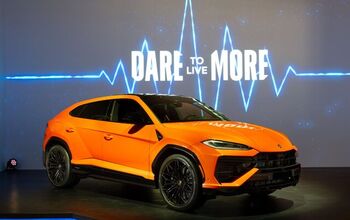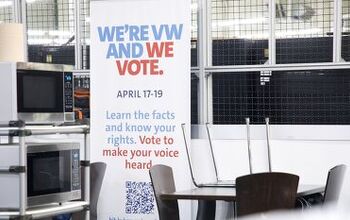Autonomous Vehicle Legislation Could Be Modeled After Vaccines

Every time we write an article about autonomous vehicles, our comments section is quickly populated with discourse over how litigation would be handled in the event of a crash. Who do you sue?
You can’t fault the driver, because a truly self-driving car takes them out of the equation. Suing the manufacturer doesn’t work because, assuming the system functions properly, they’re still saving lives and shouldering all of the risk would discourage companies from bothering to pursue the technology.
However, autonomous accidents will happen and someone is inevitably going to appear in a courtroom. The justice system has to decide how that will be handled, but Automotive News’ Katie Burke has an interesting solution. It relates to how the United States deals with legal actions involving vaccinations.
Worried that the best defense against potentially fatal diseases — some of which also cause brain damage — was going to be sued into oblivion, Congress passed the National Childhood Vaccine Injury Act in 1986. The legislation created a court within the U.S. Court of Federal Claims, called the Office of Special Masters, with the sole function of hearing vaccine injury claims. It has awarded claimants billions since its inception so that vaccine makers can continue to persist.
With the development of the Office of Special Masters, pharmaceutical companies were no longer liable for the vaccines they produced. After 1986, claims could be filed against the Department of Health and Human Services, and a panel of judges determined the case’s legitimacy. Other countries have followed suit with similarly modeled court systems.
Burke’s proposed solution for autonomous vehicle litigation would be to model something akin to the National Vaccine Injury Compensation Program. The state would provide oversight for the standards and practices of autonomous implementation and, so long as manufacturers meet those guidelines and save most of the 35,000 people every year they intend to, the government would assume the financial risk.
However, there are a few gaps in this solution that would need to be filled. In vaccine cases, more families have been compensated since the special courts took over, though the damages paid have been smaller overall. Still, it wasn’t just the families that benefited after 1986 — the pharmaceutical industry turned a corner.
“Once the courts gave them protection, pharmaceutical companies started making a lot of money,” explains David Ratcliff, an American Association for Justice researcher.
The vaccine court provides an important function to ensure dangerous illnesses remain checked, it also takes some of the burden off drug makers. Giving special protection to vehicular safety technology would need to be carefully regulated. Ratcliff believes that allowing automotive companies to a free pass would be a mistake.
“Take the Takata airbags, for example,” he said. “They’re meant to protect you but could turn you into Swiss cheese. If a safety innovation turns deadly, you want the manufacturer to be held accountable.”
There is also the matter of autonomous cars sharing the road with human drivers. Insurance companies might deem it to difficult to decide who is at fault and not bother insuring self-driving cars, especially if the government is already handling those claims. In which case, the state becomes suddenly responsible for the analysis of complicated accident investigations involving living, breathing, operators.
It’s not a perfect solution, nor does it settle all legal the matters surrounding autonomous vehicles, but it does provide a judicial precedent for how we might protect the existence of a potentially life-saving technology.
[Image: Tesla Motors]

A staunch consumer advocate tracking industry trends and regulation. Before joining TTAC, Matt spent a decade working for marketing and research firms based in NYC. Clients included several of the world’s largest automakers, global tire brands, and aftermarket part suppliers. Dissatisfied with the corporate world and resentful of having to wear suits everyday, he pivoted to writing about cars. Since then, that man has become an ardent supporter of the right-to-repair movement, been interviewed on the auto industry by national radio broadcasts, driven more rental cars than anyone ever should, participated in amateur rallying events, and received the requisite minimum training as sanctioned by the SCCA. Handy with a wrench, Matt grew up surrounded by Detroit auto workers and managed to get a pizza delivery job before he was legally eligible. He later found himself driving box trucks through Manhattan, guaranteeing future sympathy for actual truckers. He continues to conduct research pertaining to the automotive sector as an independent contractor and has since moved back to his native Michigan, closer to where the cars are born. A contrarian, Matt claims to prefer understeer — stating that front and all-wheel drive vehicles cater best to his driving style.
More by Matt Posky
Latest Car Reviews
Read moreLatest Product Reviews
Read moreRecent Comments
- TheEndlessEnigma I would mandate the elimination of all autonomous driving tech in automobiles. And specifically for GM....sorry....gm....I would mandate On Star be offered as an option only.Not quite the question you asked but.....you asked.
- MaintenanceCosts There's not a lot of meat to this (or to an argument in the opposite direction) without some data comparing the respective frequency of "good" activations that prevent a collision and false alarms. The studies I see show between 25% and 40% reduction in rear-end crashes where AEB is installed, so we have one side of that equation, but there doesn't seem to be much if any data out there on the frequency of false activations, especially false activations that cause a collision.
- Zerocred Automatic emergency braking scared the hell out of me. I was coming up on a line of stopped cars that the Jeep (Grand Cherokee) thought was too fast and it blared out an incredibly loud warbling sound while applying the brakes. I had the car under control and wasn’t in danger of hitting anything. It was one of those ‘wtf just happened’ moments.I like adaptive cruise control, the backup camera and the warning about approaching emergency vehicles. I’m ambivalent about rear cross traffic alert and all the different tones if it thinks I’m too close to anything. I turned off lane keep assist, auto start-stop, emergency backup stop. The Jeep also has automatic parking (parallel and back in), which I’ve never used.
- MaintenanceCosts Mandatory speed limiters.Flame away - I'm well aware this is the most unpopular opinion on the internet - but the overwhelming majority of the driving population has not proven itself even close to capable of managing unlimited vehicles, and it's time to start dealing with it.Three important mitigations have to be in place:(1) They give 10 mph grace on non-limited-access roads and 15-20 on limited-access roads. The goal is not exact compliance but stopping extreme speeding.(2) They work entirely locally, except for downloading speed limit data for large map segments (too large to identify with any precision where the driver is). Neither location nor speed data is ever uploaded.(3) They don't enforce on private property, only on public roadways. Race your track cars to your heart's content.
- GIJOOOE Anyone who thinks that sleazbag used car dealers no longer exist in America has obviously never been in the military. Doesn’t matter what branch nor assigned duty station, just drive within a few miles of a military base and you’ll see more sleazbags selling used cars than you can imagine. So glad I never fell for their scams, but there are literally tens of thousands of soldiers/sailors/Marines/airmen who have been sold a pos car on a 25% interest rate.


































Comments
Join the conversation
If we treat autonomous cars like vaccines, does that mean there will be a bunch of hack scientists and Jenny McCarthy claiming that autonomous vehicles cause autism?
Like swine flu vaccine? Google it if you are too young. The risk are high, very high, and with limited liability, corners will be cut without having to think about the end result.